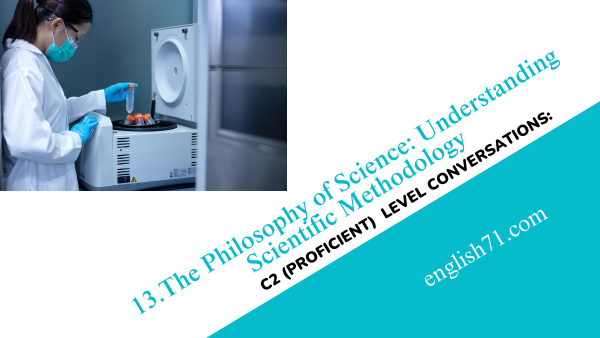C2 (Proficient) level Conversations: (13)The Philosophy of Science: Understanding Scientific Methodology

Nick: Hey Noah, have you ever delved into the philosophy of science?
Noah: Absolutely, Nick. It’s a fascinating subject. The philosophy of science delves into the foundations, methods, and implications of scientific inquiry.
Nick: Right. It’s not just about the scientific facts but also about how we acquire knowledge and the assumptions underlying our methods.
Noah: Exactly. One of the central debates is the nature of scientific truth. Some argue for scientific realism, suggesting that scientific theories aim to describe the objective reality. Others advocate for instrumentalism, where theories are valued for their predictive power rather than their truth value.
Nick: That’s interesting. And then there’s the scientific method itself, with its principles of observation, hypothesis formation, experimentation, and theory-building.
Noah: Indeed. But it’s not always straightforward. There are discussions about induction versus deduction, the role of creativity and intuition in scientific discovery, and the importance of peer review and reproducibility.
Nick: Right, and let’s not forget about the demarcation problem, distinguishing between science and pseudoscience.
Noah: Absolutely. It’s a complex and nuanced field, but understanding the philosophy of science is crucial for anyone interested in the nature of knowledge and inquiry.
Nick: Agreed. It adds depth to our understanding of the scientific enterprise and its implications for society.
Noah: Absolutely, Nick. It’s a fascinating journey into the heart of human inquiry.



Summary:
In their conversation, Nick and Noah explore the intricate domain of the philosophy of science. They delve into topics such as scientific realism versus instrumentalism, the scientific method, and the demarcation problem. Their discussion highlights the complexity of understanding scientific inquiry and its broader implications for society. Overall, they emphasize the importance of delving into the philosophy of science to gain a deeper understanding of the nature of knowledge and scientific practice.

